Installare WordPress sul tuo Mac ti consente di esplorare le sue funzionalità senza bisogno di un web host.
Imparerai come funziona WordPress e vedrai se è adatto al tuo progetto. È anche perfetto per testare temi e plugin prima di rendere live il tuo sito. Inoltre, sperimentare localmente ti dà la libertà di commettere errori e imparare.
Abbiamo sperimentato molto con i siti locali, sia su computer Mac che Windows. E in questo tutorial, condivideremo 2 semplici metodi per configurare WordPress sul tuo Mac.
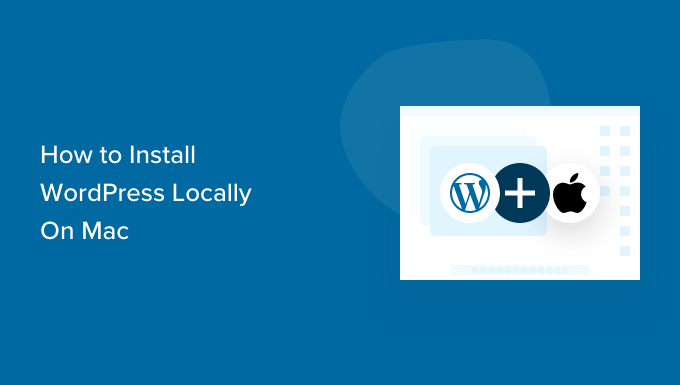
Nota: Non usi Mac? Abbiamo anche un tutorial su come installare WordPress localmente su Windows.
Perché installare WordPress localmente su Mac?
Normalmente, hai bisogno di un account di web hosting e di un nome di dominio per creare un sito web WordPress.
Tuttavia, il software WordPress principale è gratuito da scaricare e può essere eseguito localmente sul tuo computer. Questo sito WordPress locale generalmente non sarà disponibile su Internet e potrà essere visualizzato solo sul tuo computer.
Il vantaggio di questo approccio è che puoi esercitarti privatamente con WordPress, provarlo e vedere che tipo di siti web puoi creare.
Puoi anche utilizzare questa installazione locale per testare diversi temi e plugin di WordPress prima di installarli sul tuo sito web live.
Di cosa hai bisogno per installare WordPress localmente su Mac?
WordPress è scritto principalmente in PHP, un linguaggio di programmazione lato server. Per eseguire PHP, avrai bisogno di un software server web e di un sistema di gestione di database MySQL installati.
Ora, installare tutti questi software in modo indipendente e farli funzionare insieme sembra un compito arduo.
Fortunatamente, esistono strumenti di sviluppo gratuiti che rendono semplicissimo installarli come un unico pacchetto, anche per gli utenti meno esperti di tecnologia. Tenendo conto di ciò, ecco 2 metodi per installare facilmente WordPress localmente su un Mac senza alcuna competenza speciale di amministrazione server:
- Metodo 1. Installa WordPress localmente su Mac usando Local WP (Consigliato)
- Metodo 2. Installa WordPress localmente su Mac usando MAMP
- Spostare la tua installazione WordPress locale su un sito web live
Pronto? Mettiamo WordPress in esecuzione sul tuo computer.
1. Installa WordPress localmente su Mac usando Local WP (Consigliato)
Local WP è uno strumento di sviluppo WordPress che ti consente di configurare facilmente un server locale sul tuo computer Mac. Puoi anche usare Local su Windows e Linux per configurare WordPress.
Innanzitutto, dovrai visitare il sito web di Local e fare clic sul pulsante 'Download' nell'angolo in alto a destra dello schermo.
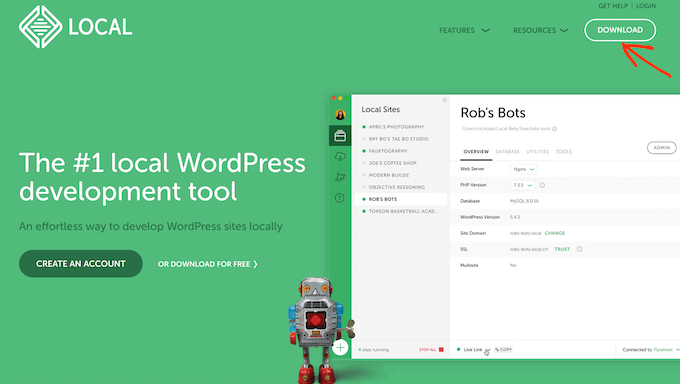
Questo aprirà una finestra popup di Download Local.
Qui, scegliamo Mac come piattaforma.
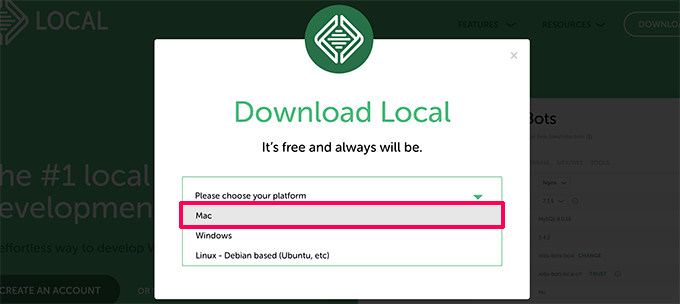
Local ti chiederà quindi di completare un breve modulo.
Dopo aver inserito il tuo nome, indirizzo email e numero di telefono, puoi procedere e fare clic sul pulsante 'Get it Now'.
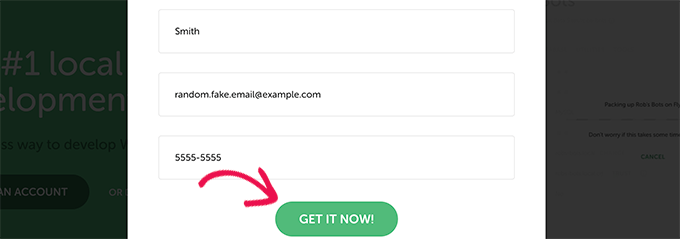
Questo scaricherà il file di installazione di Local sul tuo computer. Puoi fare doppio clic per aprire il file scaricato non appena il download è terminato.
Vedrai quindi una procedura guidata di configurazione, che ti guiderà attraverso il processo di installazione di Local sul tuo computer.
Gli utenti Mac devono semplicemente trascinare l'app Local nella loro cartella ‘Applicazioni’.
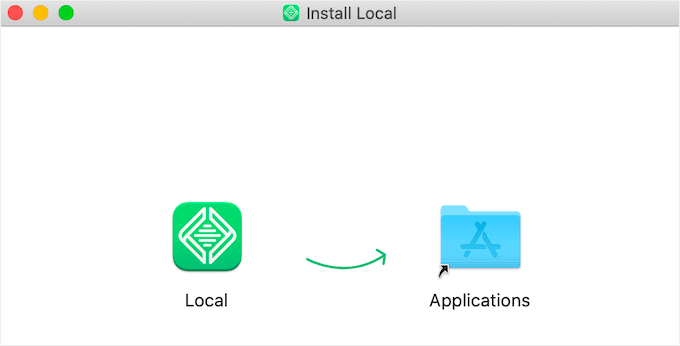
Una volta terminata l'installazione, potrai avviare l'app Local dalla cartella Applicazioni.
Al primo avvio, potrebbero esserti poste alcune domande e ti verrà chiesto di creare un account Local gratuito. Questi passaggi sono facoltativi e puoi saltarli se lo desideri.
Creare un sito web WordPress in Local
Local rende molto facile creare un sito web locale e installare WordPress rapidamente.
Per iniziare, fai semplicemente clic sul pulsante ‘Crea un nuovo sito’ per continuare.
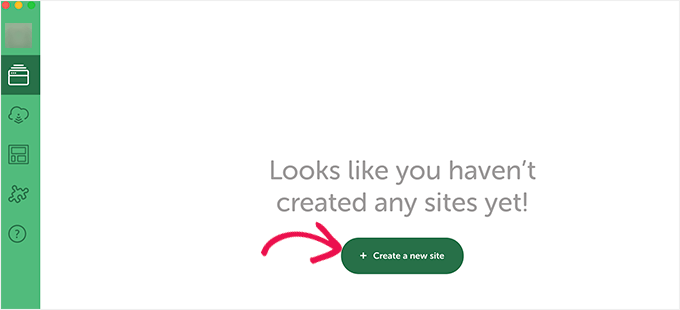
Nella schermata successiva, dovrai inserire il nome del tuo sito.
Dopodiché, procedi e fai clic sul pulsante ‘Continua’.

Successivamente, ti verrà chiesto di scegliere la tua piattaforma.
Local ti permette di scegliere quale versione di PHP, Apache e MySQL desideri utilizzare.
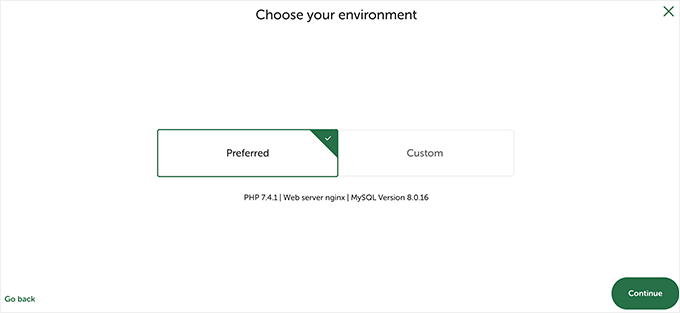
Se non sei sicuro, scegli le impostazioni ‘Preferite’ e fai clic sul pulsante ‘Continua’.
Infine, dovrai inserire un nome utente WordPress e una password. Quindi, puoi fare clic sul pulsante ‘Aggiungi sito’.
Local scaricherà e installerà ora WordPress per creare il tuo sito web. Potrebbe esserti richiesto di inserire il nome utente e la password del tuo Mac per apportare modifiche.
Una volta terminato, vedrai le informazioni sul tuo sito web appena creato con pulsanti per visitare l'area di amministrazione di WordPress o visualizzare il tuo sito locale.
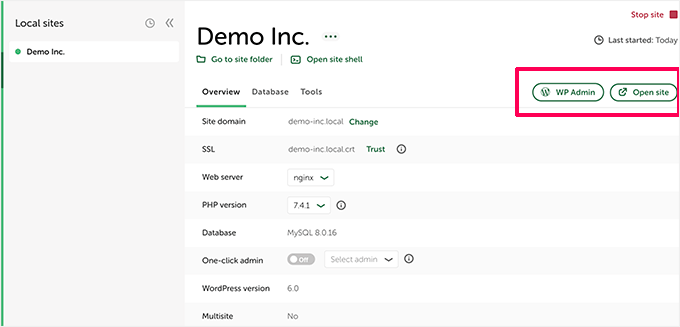
Ora puoi visitare il tuo sito web o accedere all'area di amministrazione di WordPress.
Da qui, puoi utilizzare il tuo sito WordPress ospitato localmente proprio come gestiresti un sito web live.
Puoi installare plugin e temi e progettare il tuo sito web come ritieni opportuno.
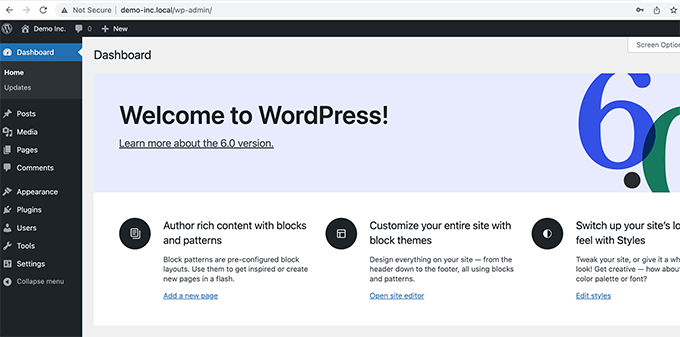
2. Installa WordPress localmente su Mac usando MAMP
MAMP è un programma popolare che ti permette di eseguire WordPress sul tuo computer Mac.
Per prima cosa, visitiamo il sito web di MAMP. Qui dovresti vedere l'ultima versione di MAMP & MAMP Pro.
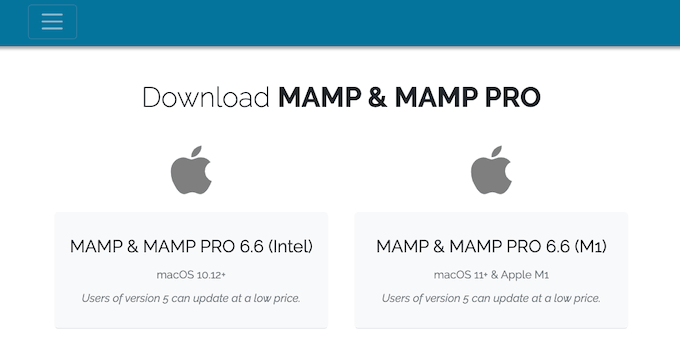
MAMP ha download separati per diverse versioni del sistema operativo macOS.
Non sei sicuro di quale versione di macOS sia installata sul tuo computer? Per scoprirlo, fai semplicemente clic sull'icona Apple nella barra degli strumenti del tuo computer.
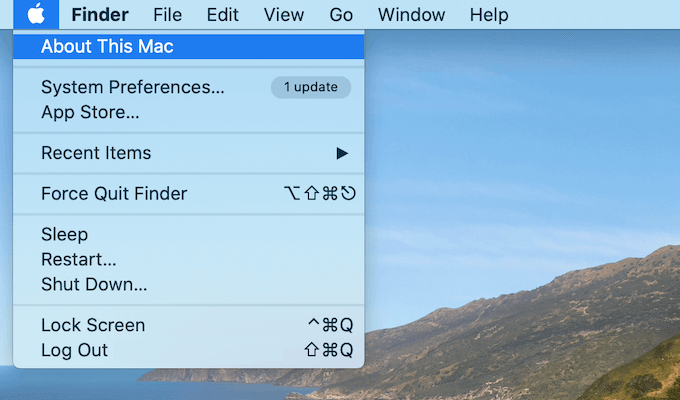
Puoi quindi fare clic sull'opzione 'Informazioni su questo Mac'.
Si aprirà una finestra popup che mostrerà molte informazioni sul tuo computer, inclusa la tua versione di macOS.
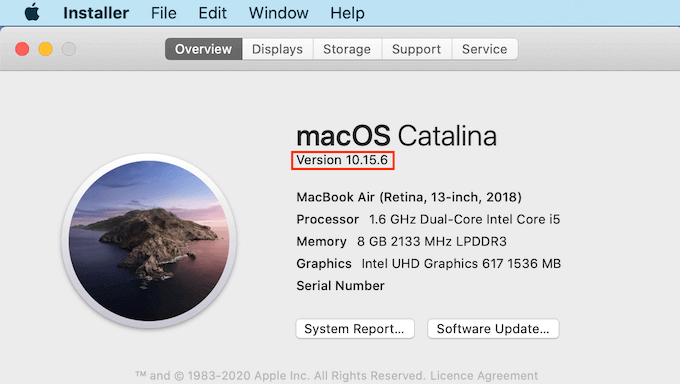
Ora puoi scaricare la versione corretta di MAMP per il tuo sistema operativo.
Una volta terminato il download, fai doppio clic sul file .pkg di MAMP. Questo avvierà l'installer di MAMP.

Ora, segui semplicemente le istruzioni sullo schermo per installare MAMP.
Dopo aver installato questo programma, procedi e avvia MAMP aprendo la cartella 'Applicazioni' del tuo computer.
Qui troverai 2 versioni di MAMP. MAMP Pro è la versione a pagamento, quindi assicurati di selezionare la versione gratuita.
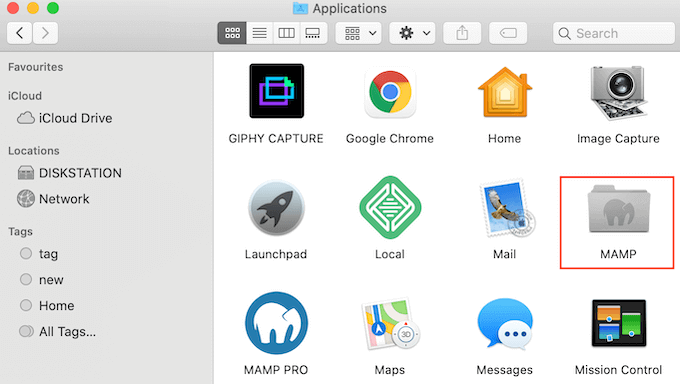
All'interno di questa cartella MAMP, troverai vari file, oltre a un'applicazione MAMP.
Fai semplicemente doppio clic per avviare l'app MAMP.
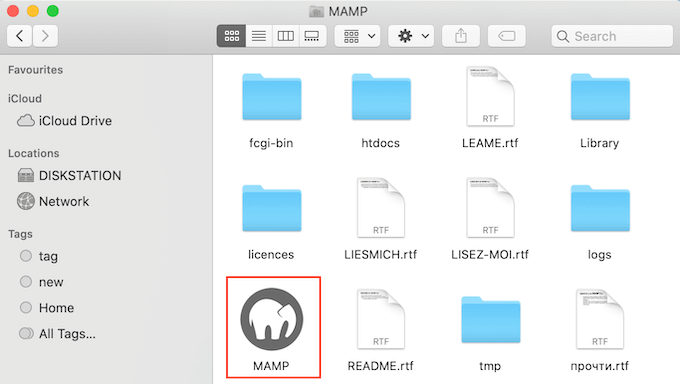
Prima di iniziare, ti consigliamo di configurare alcune impostazioni per migliorare la tua esperienza con MAMP.
Per apportare queste modifiche, fai clic su 'MAMP' nella barra degli strumenti e quindi seleziona 'Preferenze...'.
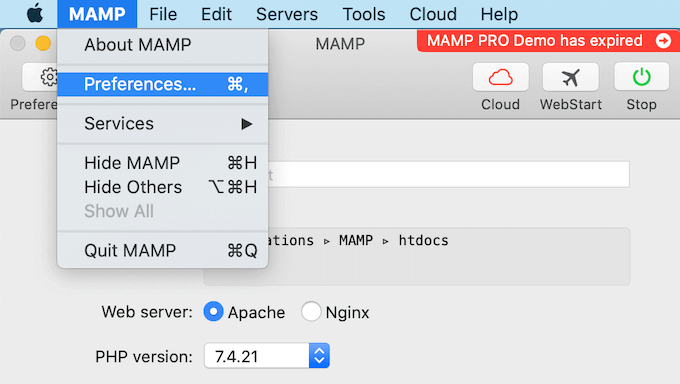
Nella finestra popup, dovrai passare alla scheda 'Porte'.
Ora puoi verificare quale porta Apache sta utilizzando MAMP. Si consiglia di passare alla porta Apache 8888 se MAMP non sta già utilizzando questa porta.
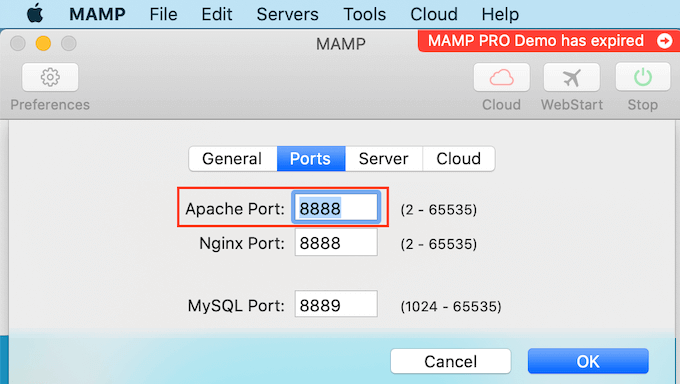
Il prossimo passo è configurare la cartella della tua root del documento. Qui creerai e memorizzerai tutti i tuoi siti WordPress locali.
Per impostazione predefinita, MAMP utilizza la cartella /Applications/MAMP/htdocs/, ma puoi cambiarla in qualsiasi altra posizione.
Nella finestra di dialogo ‘Preferenze…’, facciamo clic sulla scheda ‘Server’. La tua root del documento dovrebbe ora essere visibile.
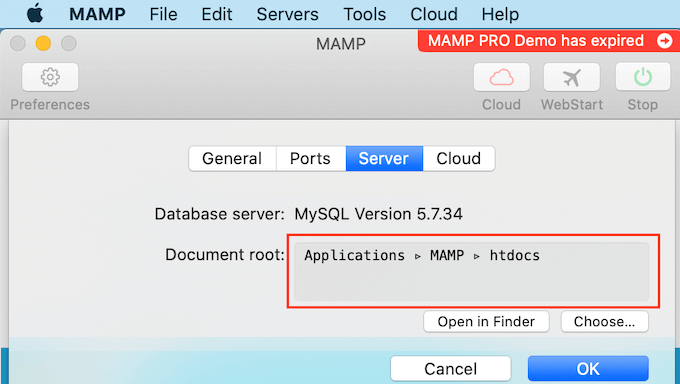
Per memorizzare i tuoi siti in qualsiasi altra cartella, fai clic sul pulsante ‘Scegli…’.
Si aprirà una finestra popup dove potrai scegliere una nuova posizione. Potresti anche voler creare una nuova cartella per memorizzare tutti i tuoi siti WordPress.
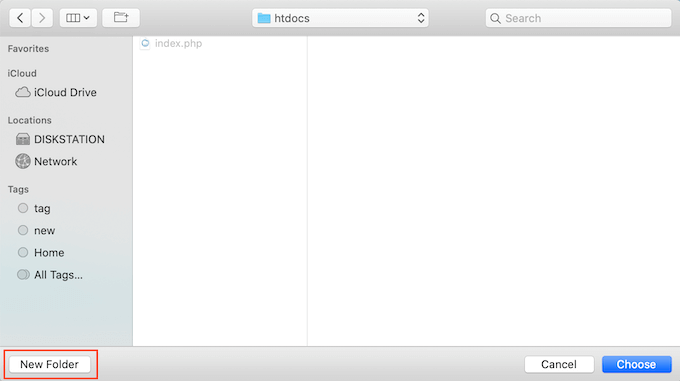
Puoi nominare questa cartella come preferisci.
Per questo articolo, memorizzeremo i nostri siti in una cartella chiamata ‘allwebsites’.
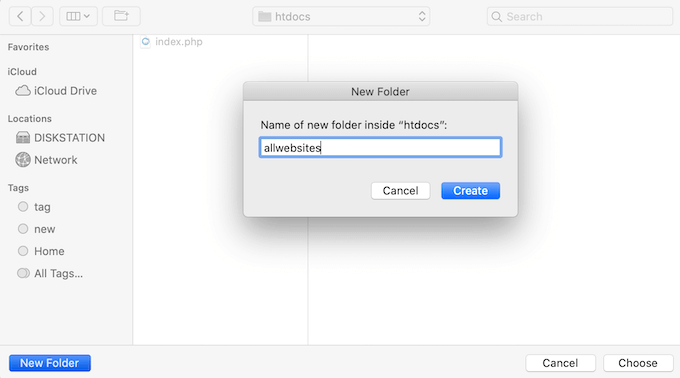
Installare WordPress su MAMP
Ora che hai configurato MAMP, è il momento di installare WordPress sul tuo computer Mac.
Innanzitutto, dovrai visitare il sito web WordPress.org e scaricare l'ultima versione di WordPress Core.
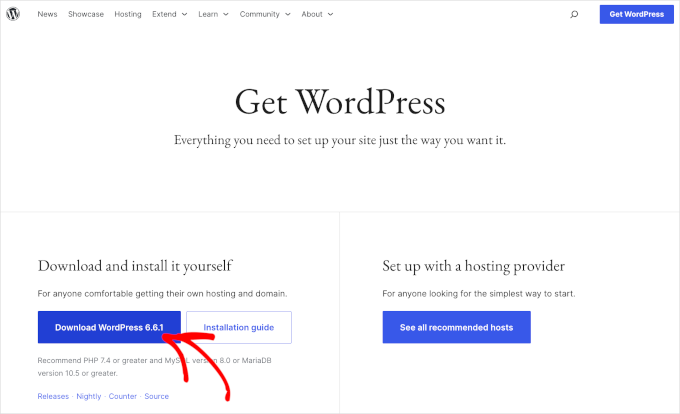
NOTA: Esistono due versioni di WordPress. Per maggiori dettagli, consulta il nostro articolo di confronto su WordPress.com vs. WordPress.org.
Dopo aver scaricato il file da WordPress.org, devi semplicemente decomprimerlo. Questo creerà una cartella ‘wordpress’ non compressa.
Ora, copia semplicemente questa cartella nella tua cartella della root del documento MAMP.
Poiché abbiamo modificato la cartella della root del documento, dobbiamo copiare ‘wordpress’ in applications/MAMP/htdocs/allwebsites.
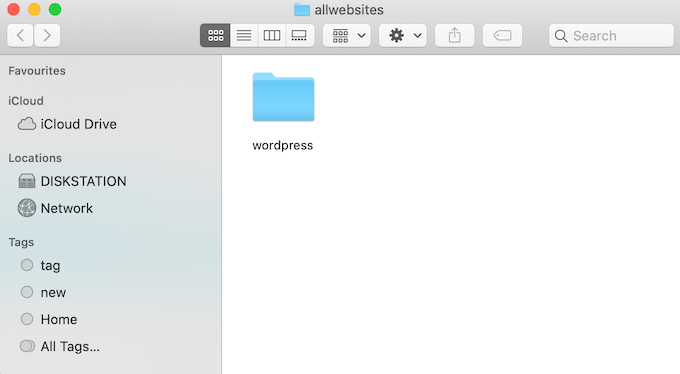
WordPress ha bisogno di un database per memorizzare tutti i suoi contenuti e dati. Dovrai creare questo database prima di poter creare un sito web locale.
Non preoccuparti, non è difficile come sembra.
Nella finestra ‘Preferenze…’ di MAMP, fai semplicemente clic sul pulsante ‘OK’. Questo dovrebbe avviare l'applicazione MAMP in una nuova scheda del browser.
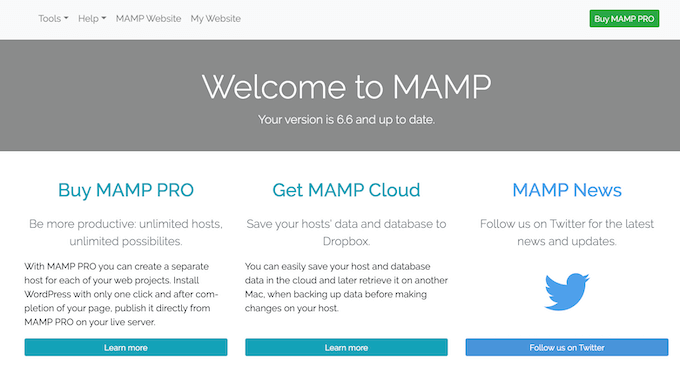
Il tuo prossimo compito è avviare phpMyAdmin. Questa è un'applicazione basata sul web per la gestione del database MySQL del tuo sito web.
Nella barra degli strumenti, naviga su Strumenti » phpMyAdmin.
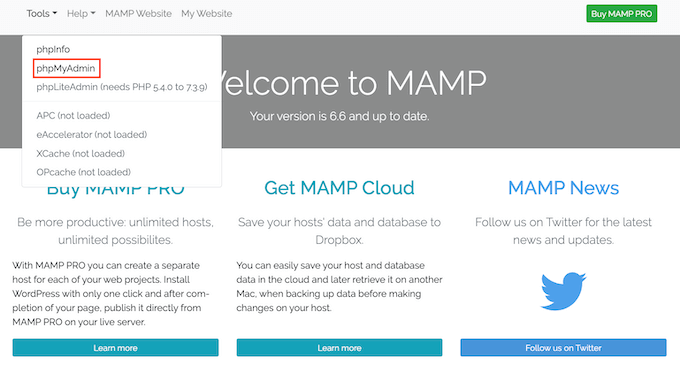
Questo aprirà phpMyAdmin in una nuova scheda.
Nella dashboard di phpMyAdmin, dovrai andare alla scheda ‘Database’.
Ora puoi digitare un nome per il tuo database nel campo ‘Nome database’ con quello che preferisci. Assicurati solo di ricordare il nome, poiché lo utilizzeremo nel passaggio successivo.
Per questo tutorial, chiameremo il nostro database ‘test_db’.
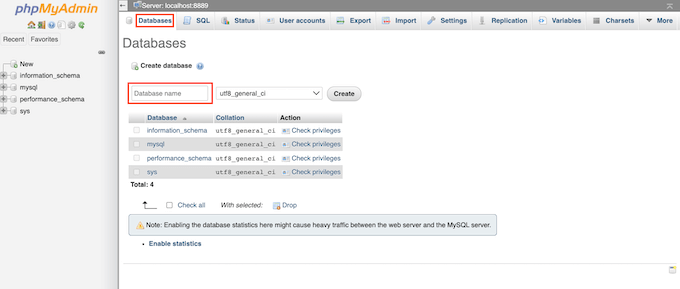
Dopo aver digitato il nome del tuo database, puoi fare clic sul pulsante ‘Crea’.
PhpMyAdmin creerà quindi il tuo database.
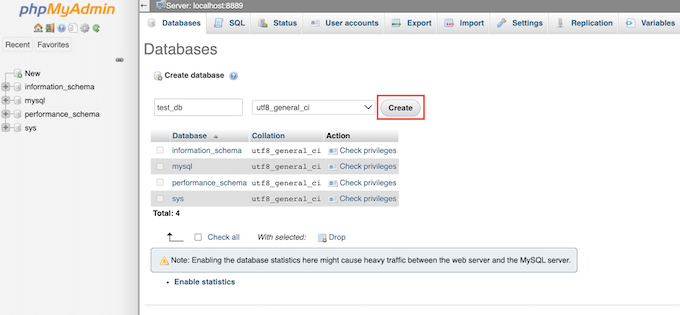
Ora è il momento di installare WordPress.
In una nuova scheda del browser, vai semplicemente su http://localhost:8888/. Se stai utilizzando una porta diversa dalla 8888, modifica semplicemente questo URL per menzionare la tua porta.
Ora dovresti vedere un link alla cartella ‘wordpress’ che hai copiato nella tua cartella dei documenti principali. Fai clic su questo link. Questo aprirà la procedura guidata di installazione di WordPress.
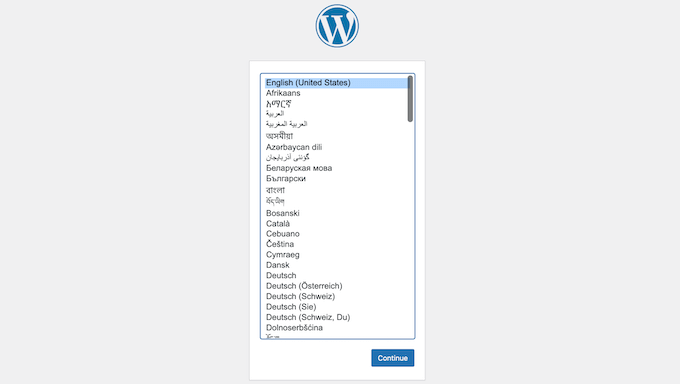
La procedura guidata di installazione di WordPress inizia chiedendoti di scegliere una lingua. Dopo aver fatto la tua scelta, puoi fare clic sul pulsante ‘Continua’.
Nella schermata successiva, WordPress ti mostrerà l'elenco di tutte le informazioni necessarie per completare l'installazione.
Dopo aver letto questa schermata, fai clic sul pulsante ‘Iniziamo’ per procedere.
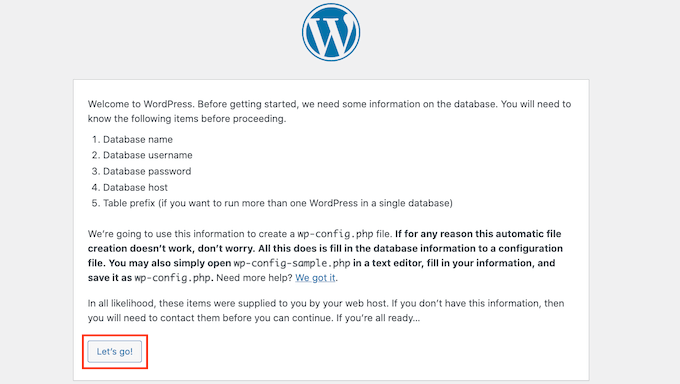
La procedura guidata di configurazione ti chiederà ora le informazioni sul tuo database WordPress. Per il nome del database, digita semplicemente il nome che hai creato nel passaggio precedente.
Per ‘Nome utente’ e ‘Password’, digita semplicemente ‘root’.
Puoi quindi digitare ‘localhost’ nel campo ‘Host database’. Localhost significa che il database e il sito web sono ospitati sullo stesso server, che, in questo caso, è il tuo computer Mac.
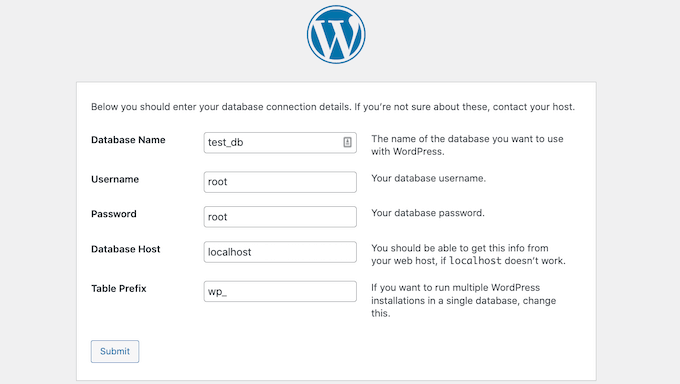
Dopo aver digitato tutte queste informazioni, fai semplicemente clic sul pulsante ‘Invia’.
WordPress si connetterà ora al tuo database e creerà un file di configurazione per te. Una volta terminato, vedrai un messaggio di successo.
Per passare al passaggio successivo, puoi fare clic sul pulsante ‘Esegui l’installazione’.
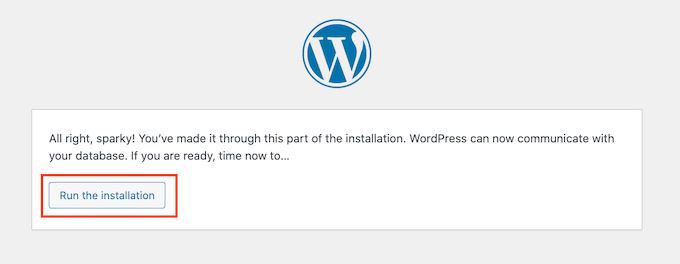
Nella schermata successiva, WordPress ti chiederà di aggiungere un titolo del sito. Ad esempio, potresti usare il nome della tua attività. La maggior parte dei temi WordPress mostra questo titolo nella parte superiore del tuo sito web.
Se non sei sicuro del titolo del tuo sito, non c’è bisogno di farsi prendere dal panico. Puoi cambiare il titolo nella tua bacheca di WordPress in qualsiasi momento.
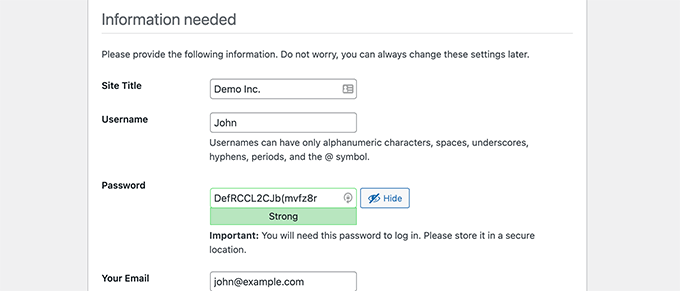
Dovrai quindi creare un nome utente e una password. Queste sono le informazioni di accesso che utilizzerai per accedere alla tua bacheca di WordPress.
Puoi anche digitare il tuo indirizzo email nel campo ‘La tua email’. Questo è l’indirizzo a cui WordPress invierà tutte le sue email amministrative.
Dopo aver completato questo modulo, fai clic sul pulsante ‘Installa WordPress’.

WordPress eseguirà ora l'installazione.
Dopo qualche istante, dovresti vedere un messaggio 'Successo!'.

Per accedere direttamente alla tua schermata di accesso di WordPress, fai clic sul pulsante 'Accedi'.
Puoi anche accedere al tuo sito WordPress locale utilizzando il seguente URL: http://localhost:8888/wordpress/wp-login.php
Nota: Se stai utilizzando una porta Apache diversa, dovrai modificare la parte '8888' di questo URL.
Ora puoi procedere e accedere al tuo sito WordPress inserendo il nome utente e la password che hai creato nel passaggio precedente.
Questo ti porterà alla dashboard di WordPress.
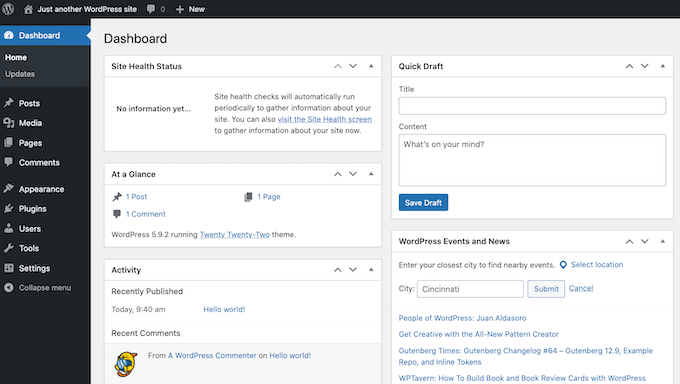
Provare WordPress in locale su Mac
Un'installazione locale è perfetta per testare WordPress o sviluppare siti web sul tuo computer. Ora che WordPress è in esecuzione in locale sul tuo Mac, ecco alcune cose che potresti voler provare:
- Sperimenta con i migliori temi WordPress.
- Prova a trovare il tuo tema WordPress perfetto.
- Prova plugin WordPress essenziali in locale.
- Impara la programmazione WordPress creando i tuoi plugin e temi personalizzati.
Spostare la tua installazione WordPress locale su un sito web live
Una volta che hai giocato con WordPress in locale, potresti voler spostare la tua installazione di WordPress su un sito web live. Questo è l'unico modo in cui gli altri potranno vedere il tuo sito web.
Per fare ciò, dovrai acquistare un nome di dominio e web hosting.
Un nome di dominio è l'indirizzo del tuo sito web su Internet, e il web hosting è dove vengono archiviati i file del tuo sito web. Puoi pensare al web hosting come alla casa del tuo sito web su Internet.
Per il web hosting, consigliamo Bluehost. Sono una delle più grandi aziende di hosting al mondo e sono anche ufficialmente raccomandati da WordPress.org.
Fortunatamente, Bluehost offre agli utenti WPBeginner uno sconto sull'hosting, un certificato SSL gratuito e un nome di dominio gratuito. In sostanza, puoi trasformare la tua installazione WordPress locale in un sito web live per $2,99 al mese.
Una volta acquistato l'hosting, potresti voler consultare il nostro articolo su come spostare WordPress da un server locale a un sito web live.
Speriamo che questo articolo ti abbia aiutato a imparare come installare WordPress localmente su Mac. Successivamente, potresti anche voler consultare la nostra guida su come creare un sito web con WordPress o vedere il nostro confronto delle migliori società di hosting WordPress gestito.
Se ti è piaciuto questo articolo, iscriviti al nostro canale YouTube per tutorial video su WordPress. Puoi anche trovarci su Twitter e Facebook.





Robin
Ciao,
Ho provato a seguire questo tutorial ma mi sono bloccato quando ho dovuto andare su localhost
Ho cambiato in root in MAMP… il mio browser restituisce una pagina bianca vuota
Non capisco cosa significhi localhost (è la root sul mio MacBook o è la root che ho impostato durante la configurazione di MAMP?
Supporto WPBeginner
È l'URL che MAMP imposta per accedere alla cartella del tuo sito e caricare correttamente il tuo sito. Se hai cambiato l'indirizzo per MAMP, dovresti andare a quell'indirizzo aggiornato.
Amministratore
Henry Barnett
Inserisco l'URL Desktop/Wp_docs/vh_website in una nuova scheda del browser e 'Impossibile raggiungere il sito'. Puoi aiutarmi per favore?
Supporto WPBeginner
Dovresti provare a raggiungerlo usando http://localhost
Amministratore
Sop
Grazie per questo tutorial! Ho installato MAMP con successo e ho WordPress in esecuzione localmente. Ci ho giocato un po' ma ora vorrei eliminarlo perché non userò più WordPress. Qual è il modo migliore per farlo?
Supporto WPBeginner
Potresti disinstallare MAMP e cancellare la cartella con le informazioni del tuo sito.
Amministratore
Lola
Se localhost/mysite non ha funzionato per te, verifica che MAMP sia in esecuzione, quindi fai clic su Webstart > My Webiste > Language e così via.
Grazie per il post,
Supporto WPBeginner
Thank you for sharing what helped you ensure the site was active
Amministratore
Russell
Dopo aver configurato sul mio desktop (grazie mille!) e aver iniziato a costruire, stavo cercando di trasferire tutto sul mio laptop copiando la cartella MAMP e la cartella Mysite con tutti i file di WordPress negli stessi posti del mio desktop. Ma non riesco a farlo funzionare dopo diverse ore passate a cercare di trovare una soluzione.
Supporto WPBeginner
Per trasferire la tua installazione locale, dovrai seguire i passaggi della nostra guida qui sotto per trasferire correttamente i tuoi contenuti:
https://www.wpbeginner.com/wp-tutorials/how-to-move-live-wordpress-site-to-local-server/
Amministratore
Simon Miles
No, non funziona se non capisci l'informatica. Questa parte qui – Vai su localhost/mysite in una nuova scheda del browser. Se hai rinominato la cartella di wordpress con un altro nome, usa quel nome qui – richiede maggiori spiegazioni. Non ho idea di cosa digitare nel browser.
Supporto WPBeginner
Se non hai chiamato la cartella in cui hai inserito i file di WordPress 'mysite', allora dovrai sostituire 'mysite' nell'URL con il nome della cartella che hai deciso di utilizzare.
Amministratore
kpatterson
Sto riscontrando un problema con la procedura guidata di installazione di WordPress sul mio browser, non si carica nulla, è solo una schermata vuota, non ci sono errori visualizzati. Qualche consiglio?
Supporto WPBeginner
Vorresti assicurarti che MAMP sia in esecuzione e, se lo è, utilizzare l'opzione di debug dal nostro articolo qui sotto:
https://www.wpbeginner.com/wp-tutorials/how-to-fix-the-wordpress-white-screen-of-death/
Amministratore
jeania
Ho lo stesso problema, come ci si assicura che MAMP sia in esecuzione?
Supporto WPBeginner
Dovresti aprire il programma MAMP e se ti dà l'opzione per spegnere il tuo server, allora MAMP è in esecuzione.
Amministratore
Geoff
wow, dopo 3 giorni passati a pasticciare con altre istruzioni, ho seguito queste e bingo, ho WordPress in esecuzione sul Mac. Grazie.
Supporto WPBeginner
Glad our guide was helpful
Amministratore
Jennifer
Success! Thank you for these instructions. It took a little trial and error a few times, but I ultimately figured it out. One thing that tripped me up for a while was that apparently I needed to click on “start servers” in MAMP before the “Open web start page” would allow me to click on it. I didn’t see that anywhere in the instructions, so maybe that will help someone else. Thanks again! Onward with playing around with Wordpress
Supporto WPBeginner
Thanks for sharing what helped you
Amministratore
nandhini
Grazie, mi ha aiutato
Imran
La pagina di WordPress non si apriva sul mio Mac... poi ho reimpostato l'impostazione della porta localhost su 8888... e poi ha funzionato
Supporto WPBeginner
Glad you were able to find a solution that worked for you
Amministratore
Mel
Thank you for the very helpful article! Other articles were not up to date and the links to other articles at the end are useful
Supporto WPBeginner
Glad our article was helpful
Amministratore
sumeet
possiamo monetizzare il blog di WordPress se stiamo ospitando tramite MAMP
?
Supporto WPBeginner
Normalmente no, poiché MAMP è per la creazione di un'installazione locale
Amministratore
Wendy
Sono riuscito finalmente a installare WordPress e ad accedere, ma una volta che tutto è chiuso e voglio tornare al mio sito WordPress locale, come posso accedervi? Mi sento una totale imbranata in questo momento... lol
Supporto WPBeginner
You would visit the localhost address you visited before and ensure MAMP is running before you try to visit the address
Amministratore
Elliott
Come si risolve questo problema? Lo vedo quando cerco di accedere all'area di amministrazione di WordPress
Questa pagina non funziona. localhost al momento non è in grado di gestire questa richiesta.
ERRORE HTTP 500
Supporto WPBeginner
Ci sono diversi motivi, potresti voler iniziare seguendo la nostra guida qui sotto:
https://www.wpbeginner.com/wp-tutorials/how-to-fix-the-internal-server-error-in-wordpress/
Amministratore
jane
i got half way then when it said to type in http localhost/mywebsite it didnt work
Supporto WPBeginner
Dovresti assicurarti che MAMP sia in esecuzione, poiché è la causa più comune di questo problema.
Amministratore
John
Grazie per il tutorial. Solo una cosa che vorrei menzionare... cambiare la posizione predefinita di htdocs in una cartella nei miei documenti ha fatto sì che MAMP non funzionasse. L'ho cambiata di nuovo in applications > MAMP > htdocs e ha funzionato.
Supporto WPBeginner
Thanks for sharing this in case others ran into this issue or this is a change to MAMP since the last update of this article
Amministratore
Marianne
Grazie per aver condiviso. Ho avuto lo stesso problema.
Jen Harrigan
Grazie per l'aiuto, mi hai salvato la vita!
Supporto WPBeginner
You’re welcome, glad our guide could be helpful
Amministratore
Willy
Quando inserisco localhost/mysite nel browser, ho cambiato il nome della cartella in wordpress_beginner, quindi ho inserito
localhost/wordpress_beginner nel browser, ma ricevo un errore che non lo trova??
Supporto WPBeginner
Potresti voler iniziare provando localhost e se questo non viene visualizzato correttamente, allora dovresti assicurarti che MAMP sia in esecuzione e non abbia errori.
Amministratore
Anjana
Copio la cartella di WordPress nella cartella mamp e rinomino quella cartella con il nome mysites. Quando provo a eseguire localhost:8888/mysites, ottengo
L'URL richiesto /mysites/index.php non è stato trovato su questo server.
Aiuto per favore
Supporto WPBeginner
Per sicurezza, dovresti assicurarti che MAMP sia in esecuzione quando provi a visitare l'installazione locale
Amministratore
A
Arrivo al punto "Fai semplicemente clic sul pulsante Apri pagina Web Start nella finestra dell'applicazione MAMP", ma questa opzione è disattivata e non cliccabile. Hai qualche idea sul perché?
Supporto WPBeginner
Uno dei servizi potrebbe non essere in esecuzione correttamente; nell'angolo in alto a destra della finestra di MAMP dovrebbero esserci icone per ogni servizio con un punto verde; se una di queste non è verde, quel servizio potrebbe essere la causa del problema.
Amministratore
Joanna Ma
Ho seguito tutti i passaggi fino all'installazione, ma non riesco ad aprire la mia pagina http:localhost, mi dice solo errore o impossibile aprire sullo schermo. Non sono sicuro di dove sto sbagliando, per favore fatemi sapere cos'altro dovrei provare!
Supporto WPBeginner
Se sei tornato dopo aver riavviato il computer, dovresti assicurarti che MAMP sia in esecuzione in modo che l'installazione locale possa essere trovata
Amministratore
Eva Giddings
Ciao, ho scaricato WordPress e creato un database, ma quando digito localhost/mysite nella barra degli indirizzi mi dà un errore 404 not found.
Ho lasciato /Applications/MAMP/htdocs/ come cartella principale e ho rinominato il file di WordPress in mysite. al momento la cartella di WordPress si trova in htdocs, è lì che dovrebbe essere?
Supporto WPBeginner
Sembra tutto corretto, sei sicuro che MAMP sia in esecuzione prima di aver provato a visitare quell'indirizzo?
Amministratore
Dan
Come riavvio WP sul mio Mac per continuare a lavorare sul mio sito, non riesco a trovare informazioni su come farlo.
Grazie,
Dan
Supporto WPBeginner
Dovresti eseguire nuovamente MAMP affinché il sito sia trovabile all'indirizzo, se è questo che intendi.
Amministratore
Andrew
Wow. SUPER FANTASTICO e gentile da parte tua prenderti il tempo di pubblicare. Questo sito web è fantastico. GRAZIE GRAZIE GRAZIE!
Supporto WPBeginner
Thank you, glad you like our guide
Amministratore
Rick Karlson
Sono arrivato al punto in cui mi hai istruito a copiare Wordpress nella cartella Document root di MAMP, E non mi hai dato alcun indizio su dove trovarla sul mio Mac Mini.
Ho scavato tra i file e le cartelle di MAMP (dopo l'installazione) e non ho trovato nulla di simile a quanto hai indicato. La mia opinione è che le tue istruzioni siano, senza questa piccola informazione, inutili.
Supporto WPBeginner
Alcuni utenti potrebbero aver modificato la posizione di installazione, ma normalmente dovresti vedere la tua cartella MAMP nella cartella Applicazioni.
Amministratore
Joan Houston
Quindi la "cartella root del documento MAMP" si riferisce alla cartella MAMP che è stata installata nella cartella Applicazioni? Anch'io sono confuso da questo.
Supporto WPBeginner
Corretto
Peter Fritz Walter
Grazie per questo tutorial completo, mi è stato molto utile.
Peter
Supporto WPBeginner
Glad our guide could be helpful
Amministratore
Carrie
Ops! Sembra che MAMP non sia più gratuito. Arrivo fino a "Apri pagina WebStart" solo per essere reindirizzato al sito web per l'acquisto.
Supporto WPBeginner
From taking a look, they bundled the pro and free versions together. You should still be able to run MAMP for free
Amministratore
Tabish Hyyat
Ehi! Per favore, aggiorna l'articolo... non riesco a capire quale sia cosa...
anurag
grazie, è davvero utile
Oleg
Grazie! Ha funzionato bene.
Andrea
Ciao, grazie per l'ottimo post! Ho installato MAMP da quando un corso di formazione su WordPress me l'ha suggerito. Avere MAMP come localhost per testare il mio sito serve allo stesso scopo di utilizzare un sottodominio come sito di staging? Ho letto i tuoi articoli su quest'ultimo e sto cercando di capire. Immagino che una differenza sarebbe che se usassi il metodo MAMP, dovrei sempre usare il mio Mac; se usassi un sottodominio e lo rendessi privato, potrei testare da qualsiasi computer. Sto pensando correttamente? In sostanza, sono un principiante che pianifica di avviare un blog e voglio assicurarmi di avere un ambiente di test. Grazie!
Supporto WPBeginner
Ciao Andrea,
Sì, usando MAMP puoi creare siti web in localhost. Questi siti web saranno accessibili solo sul tuo computer. Un sito web di staging si trova su un server live a cui si può accedere da qualsiasi computer.
Amministratore
Stan
Tieni presente che con MAMP 4.1.1 e PHP 7.1.1, vedrai phpMyAdmin in grigio. La soluzione è andare in MAMP, fare clic sulla scheda PHP e cambiare PHP in 7.0.15. Fatto!
Per impostazione predefinita, MAMP mostra solo due versioni di PHP, quindi se non vedi 7.0.15 nell'elenco, rinomina le cartelle con le versioni di PHP che non desideri utilizzare nella cartella Applicazioni/MAMP/bin/php.
Tara
Ho cambiato il charset del database nella creazione delle tabelle del database, ora non riesco a visualizzare la mia pagina web né tantomeno in wp-admin. Come si trovano i nomi dei database da MAMP su un Mac per ripristinare il nome del database? Grazie
Fannie
Quando sono in "phpMyAdmin", non vedo la scheda "database", né tutte le altre opzioni nel menu. Vedo solo una tabella (grigia e viola)... Qualcuno sa cosa ho sbagliato?
Laura
Esiste una versione più recente di questo tutorial che vada bene con la versione attuale di MAMP? Gli screenshot qui sono molto diversi. Inoltre, le istruzioni per creare la document root non sono molto chiare – prima mi consigli di metterla in una nuova cartella nella cartella Documenti (cosa che ho fatto), ma poi fai sembrare che debba essere nella cartella MAMP nella cartella Applicazioni! Non riesco a far apparire la mia pagina localhost... Questo è il mio albero di cartelle...
Macintosh HD\Applicazioni\MAMP\htdocs\SITIWEB\nome\wordpress
Quale dovrebbe essere il mio indirizzo localhost?
Ho anche provato a mettere la cartella di WordPress qui...
Macintosh HD\users\me\documents\WEBSITES\name\wordpress
I’m very confused.
BP
Dalla pagina web di MAMP clicca su “my website”, il secondo da sinistra nel menu.
Questo ti porterà al sito localhost.
lisa
sei riuscito a trovare un nuovo tutorial?
Apoorv
Questo è molto utile..!! Ha funzionato alla grande.
Charles Bewlay
Ho installato tutto – brillante – e stavo lavorando all'installazione di un template dal fornitore del template. Mi ha chiesto di selezionare un file zip di Cherryframework. L'ho fatto e poi tutto è diventato nero. Non sono più riuscito a vedere nulla. Mi sono reso conto di aver selezionato il file Cherryframework sbagliato – non quello nella cartella del template ma uno dall'esterno che avevo scaricato in precedenza e che avevo solo nella mia cartella "nuovo sito web".
Non ho davvero voglia di dover ricominciare da capo. quando guardo tutta la mia cronologia precedente, ottengo solo pagine bianche.
Aiuto!
Charles Bewlay
Many thanks guys, couldn’t have gone anywhere without you
Ed
I’m developing WordPress sites locally and then move it to a live server when i’m done. But when i start new projects locally I don’t really know how to handle the old files from previous work and databases?? Shall I just delete database, files and everything and start again??
Michael
Ok, ho impostato la mia pagina WordPress usando MAMP sul mio Mac qualche settimana fa e funzionava e potevo modificare il contenuto. Ma tornando ora, non riesco a modificare, solo a visualizzare la mia pagina. Avvio MAMP, vado alla 'WebStart Page', clicco su 'My Website' dalla barra dei menu e scelgo la mia pagina. Si carica, ma non vedo come accedere all'editor di WordPress??
Aiuto per favore…
Supporto WPBeginner
Speriamo che tu abbia provato ad accedere all'area di amministrazione del tuo sito web visitando l'URL:
http://localhost/wp-admin
Questo URL potrebbe differire a seconda di come hai installato WordPress. Supponiamo che tu l'abbia installato in una cartella mysite, allora il tuo URL di accesso sarebbe.
http://localhost/mysite/wp-admin
Controlla anche la nostra guida su come trovare l'URL di accesso di WordPress.
Amministratore
Carolyn
Non è chiaro dove creare il file sottostante. Non l'ho visto in MAMP né nella nuova finestra. Se devi guidare le persone passo dopo passo nel fare qualcosa, devi essere CHIARO!
Apri una nuova finestra del browser e digita http://localhost/mysite. Se hai rinominato la cartella di wordpress con un altro nome, usalo qui. WordPress ti notificherà che non è stato possibile trovare il file wp-config.php.
Fai clic sul pulsante Crea un file di configurazione.
Crea un file di configurazione per WordPress in MAMP su Mac
M L Williams
Ho tutto installato e funzionante, solo che ho seguito altre istruzioni e non ho usato la porta 80. Inoltre ho finito per usare la cartella predefinita del sito htdocs all'interno di Applicazioni.
C'è un modo per ricominciare da capo e reinstallare tutto come dici tu? Non riesco a rendere il mio sito multisito, che era il motivo per cui mi sono imbarcato in questo tunnel.
Grazie mille per l'articolo. È ben scritto e molto utile, proprio quello che cercavo. Vorrei solo averlo trovato prima.
Supporto WPBeginner
Sì, puoi disinstallare MAMP semplicemente visitando Applicazioni in Finder e poi eliminando MAMP.
Amministratore
Dee
Mi stavo chiedendo: qual è il senso di installarlo su un MAC se possiamo lavorare tramite il sito web di WordPress? Sto cercando di capire se vale la pena scaricarlo sul mio MAC o se va bene lavorare tramite il sito web normale. Grazie.
Elisabeth Howlett
Articolo molto utile, da una persona grata che pensava che NON sarei riuscito a completare l'installazione di MAMP e poi di WordPress. Ci sono riuscito!!!
Claire
Ho problemi in cui non ottengo l'opzione 'Crea un file di configurazione'. Prima mi appare la finestra con le informazioni del database di WordPress, poi ricevo un errore 'Errore di connessione al database' (screenshot qui sotto) - ma nessuna opzione per creare la configurazione.
Sto facendo qualcosa di sbagliato? Qualsiasi aiuto sarebbe molto apprezzato.
Grazie
Gorish Aggarwal
anch'io sto riscontrando lo stesso errore. hai scoperto come risolverlo?
Liza
Ho avuto lo stesso problema. C'era una password del database generata automaticamente nel mio file wp-config.php, quindi l'ho cambiata in 'root' e ha funzionato. Ovviamente dovresti cambiare la tua password dopo aver fatto funzionare tutto.
/** Password del database MySQL */
define(‘DB_PASSWORD’, ‘root’);
SoHoWebStudio
Grazie per l'aiuto ragazzi. Prima volta che faccio queste cose. Aiuta avere buone istruzioni. Alcuni passaggi sono stati automatizzati, ma va bene. Vediamo come va da qui. Sono sulla buona strada per costruire il mio sito web. Grazie ancora.
Laura
I installed MAMP and got WordPress running, but for some reason my changes to the CSS aren’t being reflected on the page. At first I thought it was a caching issue, until I realized that it’s reflecting other changes, such as adding an item to the navigation menu. It’s the custom.css file it’s not seeing. (I am using Thesis 1.8.5.) Does it have anything to do with my naming the root folder dev-site instead of htdocs? Also my WP installation is directly inside the root folder, not two levels down. Thanks for any ideas you guys might have.
AM
Ho avuto anche io questo problema. Prima ho spostato la cartella del documento root dal mio desktop in 'documenti'. Poi ho cambiato la root in MAMP. Quando ho 'aperto la pagina di avvio' sono andato su phpLiteAdmin e ho creato un database lì. Anche se WordPress diceva che non riusciva a trovare il nome del database che avevo creato lì (ho usato il nome del database di phpMyAdmin), penso che abbia comunque risolto il mio errore 404 non trovato.
Tay
Avete cambiato i numeri delle porte?
Gaetan
Grazie a voi ho installato con successo Wordpress sul mio computer. Ora ho un altro problema :
Ho già un blog WordPress attivo che funziona tramite la versione web online di WordPress su wordpress.com.
Come posso accedere al blog che ho già creato tramite la versione web sulla versione che ho appena installato sul mio computer?